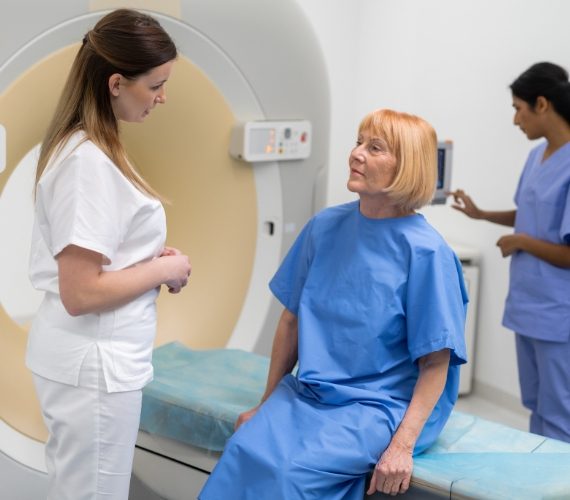Login
Imaging Services
MRI/MRA
MRI is very useful in diagnosing a variety of conditions and disorders.
What is an MRI?
Known to most as MRI, magnetic resonance imaging is a technique that enables physicians to see internal organs without using surgery or X-rays. MRI does not use radiation like traditional X-ray modalities. A sophisticated computer enhances images created by a magnetic field and radiofrequency waves. These images are transformed into sectional views of the organ or area being studied.
Open MRI
ChristianaCare is equipped with advanced, high-field Open MRI scanners, which are better than other Open MRI scanners because they generate images that are comparable in quality to standard MRI scanners.
Most people are comfortable with traditional MRI scanners, but for patients who are severely claustrophobic or require additional space, ChristianaCare offers Open MRI. An Open MRI scanner works the same as a traditional MRI scanner, but it is built with additional room for the head, arms and legs. Open MRI is currently available at our Smyrna and Brandywine locations. If you prefer Open MRI, please tell the scheduler when you call to make your appointment.
Preparing for your MRI scan
Usually there are no special preparations required for an MRI scan. Unless your doctor tells you otherwise, you may eat normally and should continue to take any medications you regularly take. MRIs generally are not recommended for pregnant women. Please tell us if you are pregnant or think you may be pregnant.
It is also important that you tell us if you have any metallic devices in your body. These objects may interfere with the MRI’s magnetic field.

The Procedure
In some cases, you may be given an injection that will provide contrast in the images that is needed to enhance the detail of particular body parts.
You will lie on a table that positions you within the MRI unit, a large open-ended tube that will surround your body while you are being scanned. A trained and licensed radiologic technologist will observe you from another room, talking with you via intercom, while he or she operates the computer that controls the MRI unit.
You will hear some tapping noises, as the computer generates the MRI images; during this time you should lie motionless so that the images are as clear as possible. If you feel uncomfortable, please tell the technologist, who can hear you at all times. We will provide you with ear-plugs or headphones.
Contact Us
To schedule an appointment, call 302-838-3088 or toll-free 877-838-3088.


